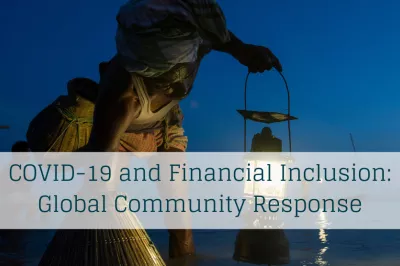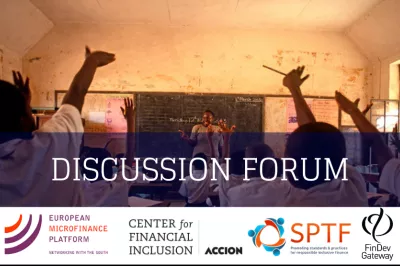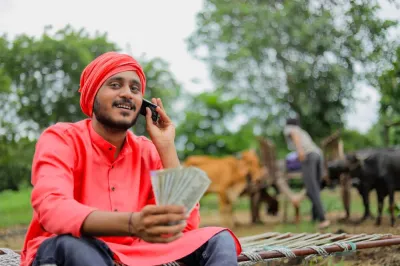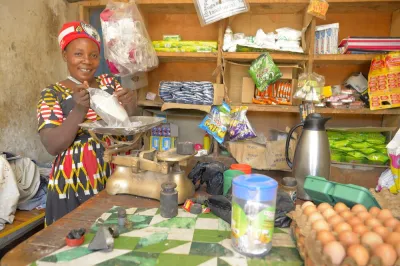COVID-19 FinDev Weekly Update | 14-20 May 2020
FinDev Gateway has created this COVID-19 weekly update with the latest and most relevant knowledge resources for financial inclusion as they become available. Sign up to receive FinDev's weekly update each Friday with a summary of the main issues covered during the week.
If you have content to share in our weekly update, please submit here or contact us directly.
Weekly Summary
- MFIs issue a call to action for investors. Under the leadership of Andrée Simon of FINCA Impact Finance, a new coalition of microfinance institutions is forming to raise the profile of microfinance organizations as critical players in the response to the ongoing crisis. These organizations, including their partners and investees, serve more than 80 million customers, 69 percent of whom are women. The coalition plans to issue a call to action for donors and policymakers next week.
- Remittance service providers’ (RSPs) respond to COVID-19. Recent insights published by UNCDF show that some RSPs may be unable to sustain the crisis for longer than three months. Providers call for governments to recognize remittances as essential services and include RSPs in their fiscal support measures. Also, simplifying customer due diligence for lower-risk accounts, remote account opening, and access to appropriate identity documents will enable digital remittances.
- Rethinking how governments make payments to pensioners. The World Bank suggests steps to reduce risk of infection among elderly who receive cash payments, including staggering of payments, reducing frequency, new queuing protocols, or allowing collection by proxy. Digital payments are also encouraged; Rwanda and India can provide lessons in that regard.
Asia
- A recent survey of MFIs in Indonesia highlights the challenges that institutions there are facing during the pandemic. Regulatory measures may have impacted client behavior as almost half of the institutions surveyed said they are dealing with customers who refuse to pay their loans although they have the means to do so.
- In Nepal, banks have digitized remittance processing after the lockdown began on 24 March, as the central bank tries to promote electronic transactions across the country.
- The Indian government has announced a second tranche of economic relief measures to support migrants, street vendors, small traders and farmers. Small loans of up to $660 provided under the Micro Units Development and Refinance Agency (MUDRA) will be eligible for a 2 percent interest subvention, under a scheme which aims to benefit 30 million people. The government also opened a $660 million special credit facility for street vendors, under which a vendor can get initial working capital up to $132. The program aims to benefit 5 million workers.
- The government of Bangladesh is providing direct cash assistance to 5 million families affected by coronavirus. The $30 transfer is considered a gift for the Muslim celebration of Eid and will be delivered via mobile banking to each family.
Africa
Some articles and knowledge resources referenced in this section are in French.
- Ghana becomes the world’s first country to launch a digital financial services (DFS) policy. The government hopes to leverage DFS in its COVID-19 response.
- In Nigeria, banks closed during lockdown, but many agents continued to offer financial services using mobile payment apps. In Rwanda, where the National Bank of Rwanda instituted a temporary policy of zero fees for mobile money and cashless transactions for three months, more people are switching to mobile money transfers.
- With money transfer agencies closed and remittances expected to drop, some financial service providers in West Africa are limiting the use of cash.
- In Brazzaville, Republic of Congo, a combination of lost incomes and higher food prices due to disrupted food supply chains has led to an increase in hunger. In South Africa, gangs deliver food in poor neighborhoods amid lockdown. Lessons from past crises can help to strengthen food supply chains.
For more on Africa, check out the latest Portail FinDev Weekly Update in French.
Latin America and the Caribbean
Most articles and knowledge resources referenced in this section are in Spanish.
- Brazil emerged as the country with the third highest number of confirmed coronavirus cases. About 13.5 million people in Brazil live in extreme poverty, which is expected to increase by up to 9 percent in 2020.
- Countries in Latin America and the Caribbean have spent an average of 2.4 percent of GDP in emergency fiscal packages, which is less than the global average of 3.7 percent. Peru is the highest spender (9 percent of its GDP) while Nicaragua has not committed any spending to confront the pandemic.
- In Colombia, the microcredit sector claims that a parliamentary proposal to remove negative data from credit bureau reports could force financial institutions to tighten their lending, and leave more than 3.2 million people in the hands of loan sharks.
- The Ecuadorian Government is proposing a law that will require financial institutions to restructure client debt and reduce interest rates; the microfinance sector says the proposal is politically motivated.
For more on LAC, check out the latest Portal FinDev Weekly Update in Spanish.
Arab World
Some articles and knowledge resources referenced in this section are in Arabic.
- The Lebanese Microfinance Association (LMFA) launched a mini-series of video interviews with financial inclusion experts on the impact of COVID-19 on MFIs and the role of the sector in the recovery phase.
- The Jordanian Microfinance Network, Tanmeyah, says the lockdown has given way to informal lending in the country.
- According to the latest Wamda Research Lab report, over 70 percent of startups in the Middle East and North Africa have been negatively impacted due to the pandemic, while 50 percent have experienced disruption in funding.
- Food prices have increased in most countries in the region. The highest increases were in Iran, Lebanon and Yemen, where prices of staple foods increased by more than 10 percent since February.
For more on the Arab world and resources in Arabic, check out the latest FinDev Weekly Update in Arabic.
COVID-19 Resources

Global Community Response to COVID-19
A list of organizations offering resources and insights on COVID-19 & microfinance
FinDev Coronavirus Data Tracker
Data relevant for financial inclusion - find out who is tracking what

Discussion Forum
Forum for the financial inclusion sector to discuss responses to COVID-19
Blogs & Opinion
If you have a blog idea and would like to write for the FinDev Blog, please see our review our guidelines. We do not cross-post blogs that have been published elsewhere, but if you wish to share an existing blog post in our next FinDev Weekly Update, you can send it to us using our contact form.
Microfinance Sector Response
From the Microfinance Coalition: Call to Action for Investors
Benchmarking an MFI’s Liquidity Risk in the Context of the MIX Market Peer Group Analysis
Resilience and the Three Phases of Response
Digital Financial Services
Ghana Launches World’s First Digital Finance Policy Amid COVID-19
The Death of Cash: Greatly Exaggerated?
When Digital Payment Goes Viral: Lessons From COVID-19’s Impact on Mobile Money in Rwanda
Fast Payments Benefit Senders and Recipients Alike - Especially in a Crisis
Policies for MSME Survival, Resilience and Recovery
Focus on Customers
Formal Financial Services, Informal Workers: How Can Financial Services Work for the Gig Economy?
Q and A: Using Comics for COVID-19 Awareness
A First Look at Gendered Impacts of COVID-19 on Livelihoods
Hrishipara Diaries: How One Community in Bangladesh Has (So Far) Weathered the COVID-19 Storm
Food Security During – And After – COVID-19: A Short and Long-Term Strategy for Funding Agribusiness
Remittances
Migrant Remittances Will Plummet. Here Is What That Means for Global Development
Migrant Remittances in the Times of Covid-19: Insights From Remittance Service Providers
Recent Publications
For a complete list of publications and to learn how you can share your research with us, visit FinDev's Publications page.
Impact of COVID-19 on MFIs in Indonesia: A Rapid Assessment
This study is expected to inform stakeholders on ways to provide support to microfinance institutions so that they can continue their work, sustain their own business and extend financing to low-income households and microbusinesses.
SME Finance Responses to COVID-19 in AFI Member Countries
This factsheet highlights various measures taken by some countries to encourage business operations, safeguard jobs and increase domestic investment.
View All Publications Related to COVID-19 >
News
For the latest news on the impact of coronavirus on financial inclusion, visit our News listing pages.
For Many Cambodians, Debt Repayment Bigger Threat Than COVID-19
Deep household debt might soon push Cambodia into a crisis as job losses caused by Covid-19 make it even harder for families repay loans, experts and debtors say.
World Bank Approves $1 Billion Financing for Kenya, to Address COVID-19 Financing Gap and Support Kenya’s Economy
Kenya has undertaken policy reforms that directly benefit many low-income Kenyan households.
El Salvador Receives $173.3 Million Less in Remittances in the First Quarter of 2020
Family remittances received by El Salvador totaled $1,600.7 million in the period from January to April 2020, lower by $173.3 million compared to the same period of the previous year.
Bangladesh: COVID-19 and the Coming Microinsurance Revolution
COVID-19 has brought to the forefront the potential for microinsurance in the Bangladesh market, where over 30 percent live below the national poverty line and insurance penetration is extremely low.
View All News Related to COVID-19 >
Webinars
For the latest events - hosted by organizations worldwide - exploring the impact of coronavirus on financial inclusion, visit our Events listing page.
Microfinance in the COVID-19 Crisis: A Framework for Regulatory Responses
Virtual Roundtable on COVID-19 and Women’s Economic Empowerment
Business Survival Bootcamp for Businesses in Rwanda
.png)


